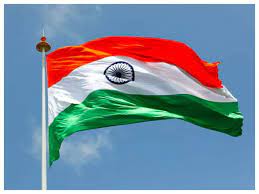
MVIRDC WTC Mumbai Hosts 79th Independence Day Ceremony
by Opinion Express / 16 August 2025Mumbai, 15 August 2025: MVIRDC World Trade Center (WTC) Mumbai celebrated India's 79th Independence Day with a grand flag-hoisting ceremony hosted by WTC Chairman Dr. Vijay Kalantri.
In his welcoming address, Dr. Vijay Kalantri underscored the significance of Independence Day. He spoke about Viksit Bharat, an empowered, self-reliant, and globally engaged India. “Our growth story is defined not just by self-sufficiency but by our contribution to the global economy,” Dr. Kalantri noted, urging the nation to continue striving toward higher goals.
The ceremony was graced by distinguished chief guests Shri Vishwas Nangare Patil, IPS, Additional Director General of Police, Anti-Corruption Bureau, Maharashtra State, Mumbai, and Adv. Rahul Narwekar, Hon’ble Speaker, Maharashtra Legislative Assembly.
In his address, Shri Vishwas Nangare Patil emphasized India's unique identity as a sovereign, socialist, secular, democratic republic. He called on citizens to honour not only their fundamental rights but also their fundamental duties highlighting the importance of the day. “Viksit Bharat is possible when each individual upholds the spirit of our Constitution and actively contributes to national progress,” he remarked.
Adv. Rahul Narwekar reflected on the significance of India's youth, noting that with an average age of 27, the country is the world’s youngest democratic republic. He praised the nation’s transformation from facing basic manufacturing challenges 79 years ago to today’s thriving, export-driven economy.It is noteworthy that India has emerged as the world's fourth-largest economy under the visionary leadership of Prime Minister Narendra Modi. He also lauded Maharashtra's march toward a trillion-dollar economy and India's role as a global provider, especially during challenging times like the COVID-19 pandemic, when India not only met domestic demands but also extended support to the international community.
The presence of senior officials from the consulates of Indonesia, Sri Lanka, Vietnam, and Panama underscored the importance of international friendship and cooperation fostered by WTC Mumbai. Adv. Rahul Narwekar highlighted WTC’s ongoing efforts to bring together global stakeholders and support India's role as a responsible international partner.
With the flag unfurled and patriotic fervour in the air, the event reaffirmed the commitment of MVIRDC WTC Mumbai to the nation’s spirit of unity and pride.

Tribhuvan Sahkari Univ Bill: A Milestone in Cooperative Education
by Binod Anand / 03 February 2025The cooperative sector plays a crucial role in India's socio-economic framework, providing livelihoods to millions and ensuring equitable growth. Recognizing the immense potential of this sector, the government has introduced several reforms, including the establishment of a structured and standardized education system for cooperatives. The "Tribhuvan" Sahkari University will serve as a central hub for cooperative training, offering specialized courses to empower individuals and organizations in this sector. By integrating cooperative principles into mainstream education, the university aims to equip students, cooperative society members, and industry professionals with the necessary skills to drive innovation and efficiency in cooperative enterprises. This initiative will also foster research and development in the cooperative sector, bridging the existing knowledge gap and strengthening India's cooperative movement on a global scale.
A distinctive feature of this initiative is the inclusion of Vedic knowledge and values in the university’s curriculum. Vedic rhymes and teachings, known for their profound wisdom and moral grounding, will be incorporated to instill ethical governance and sustainable development principles in cooperative management. This fusion of ancient wisdom with modern education aligns perfectly with Modi’s vision of a self-reliant and culturally enriched India. The university’s curriculum will emphasize holistic learning, integrating traditional Indian economic philosophies with contemporary management techniques. By drawing inspiration from the Vedic traditions, students will gain insights into sustainable agricultural practices, ethical business conduct, and community-driven economic models, ensuring that cooperative societies operate with integrity and social responsibility.
One of the primary objectives of the university is to standardize cooperative education and training across the country. Currently, the cooperative training landscape in India is fragmented, lacking uniformity and accreditation. The establishment of "Tribhuvan" Sahkari University will not only streamline cooperative education but also enhance the global competitiveness of India’s cooperative sector. The university will offer diploma, degree, and certification programs tailored to different cooperative sectors, including dairy, fisheries, agriculture, banking, and marketing. Additionally, it will collaborate with international cooperative organizations, bringing best practices from around the world to India’s cooperative framework.
Tribhuvan Sahkari University will serve as a unifying force, bringing together diverse institutions such as ICAR centres, Krishi Vigyan Kendras, CSIR institutions, health-related institutes, and other universities. By integrating knowledge from various sectors, it will train PACS secretaries and complement all national development departments, ensuring a multi-disciplinary approach to cooperative growth. This collaboration will shift the narrative beyond Minimum Support Price (MSP), enabling cooperatives to explore innovative market-driven solutions and self-sustaining business models. Additionally, the university will align with health institutions to develop cooperative models for rural healthcare, ensuring affordable and accessible medical services for all. By bridging the gap between cooperative education and national development goals, this university will safeguard national interests and strengthen India's socio-economic fabric.
A major component of this initiative is to protect national interests by securing the economic rights of farmers and artisans through the creation of a robust agricultural and artisan value chain. Farmers and artisans form the backbone of India's rural economy, and their sustainability is crucial to the nation’s self-reliance. The university will work towards developing comprehensive supply chain models that integrate small-scale producers into modern cooperative networks. This will help in eliminating middlemen, ensuring fair pricing, improving access to markets, and enhancing product quality and value addition. By implementing innovative agricultural techniques, organic farming, rural industrialization, and digital platforms, the university will empower farmers and artisans to compete in national and international markets, making India a leader in sustainable production.
A core vision of Tribhuvan Sahkari University is to catalyze a structural shift in India’s economic landscape, aiming to generate 50% of the Gross National Product (GNP) from the cooperative sector by 2047. Through extensive research, training, and policy advocacy, the university will incubate human resources that drive entrepreneurship, end unemployment, and ensure financial inclusion. By fostering Sustainable Development Goals (SDG) to Environmental, Social, and Governance (ESG) transformation, the university will prepare cooperative enterprises to operate with sustainability and resilience, ensuring long-term economic stability. It will encourage cooperatives to adopt green technologies, ethical business practices, and inclusive governance frameworks, positioning India as a global leader in sustainable cooperative development.
The proposed Centre of Excellence for Cooperatives and Cooperation envisions itself as a transformative hub dedicated to catalyzing the growth and development of cooperatives across India. This Centre will redefine cooperative education and administration, positioning cooperatives as key drivers of economic and social progress. The Centre will be established in collaboration with the Alumni Association of DCBM officers of VAMNICOM, ensuring that its reach extends to various parts of the country. This decentralized approach will allow cooperative professionals and stakeholders from different regions to benefit from localized expertise and customized training solutions.
The Centre will also undertake research projects, including comparative analyses of global cooperative models, exploring digital innovations like blockchain in cooperatives, and enhancing cooperative entrepreneurship through mentorship and funding mechanisms. The collaboration with the Alumni Association of DCBM officers of VAMNICOM will further ensure the dissemination of expertise across various regions, creating a network of cooperative learning hubs. The university will also focus on improving supply chains by integrating local cooperative networks with national and global trade channels, ensuring that India's agricultural and artisanal products gain the recognition they deserve on a global scale.
The introduction of the "Tribhuvan" Sahkari University Bill is a testament to Prime Minister Narendra Modi’s visionary leadership and his commitment to fostering inclusive growth through cooperative empowerment. This initiative will create a pool of skilled professionals dedicated to strengthening the cooperative movement, ensuring that India's cooperative societies thrive in the 21st century. As India marches towards economic self-sufficiency, the cooperative sector will play a pivotal role in achieving sustainable development and rural prosperity. With the backing of robust educational infrastructure, scientific research, and traditional wisdom, the "Tribhuvan" Sahkari University and the Centre of Excellence will become beacons of knowledge, guiding the cooperative movement toward new heights.
Through this landmark initiative, Modi’s promise of "Sahkar Se Samriddhi" is not just a slogan but a transformative vision that will redefine India's cooperative landscape for generations to come. As the Vedas say — Let us move together, speak together, and let our minds be united in understanding, for it is through unity and cooperation that the path to prosperity is forged.
By Binod Anand, National President, Alumni Association of PGDCBM officers of VAMNICOM, GOI and Member – Hon’ble PM Committee on MSP and Agricultural Reforms, GOI

ISB Launches ‘PGP YL’ - A 20 Month Post Graduate Programme In Management
by Opinion Express / 19 September 2024September 18, 2024: Renowned for setting new benchmarks in management education since its inception in 2001, the Indian School of Business (ISB), is poised to embark on another groundbreaking path in its mission to groom future leaders for India and the world. ISB has announced the launch of PGP YL - a 20 month Post Graduate Programme in Management for Young Leaders (PGP YL), a full time MBA equivalent residential management programme for high-potential aspirants with up to 2 years of full-time work experience.
Commencing in mid 2025, ISB’s PGP YL will offer a comprehensive learning experience through an innovative and cutting-edge curriculum designed as a response to the rapidly evolving business landscape and technology disruptions. The research backed PGP YL curriculum will blend foundational business principles with advanced technology, data, analytics courses and global perspectives to develop students into innovative problem solvers.
Given the students' limited work experience, the PGP YL curriculum has been designed to incorporate significant experiential learning components, including a Business Design Lab and an Innovation Lab. Additionally, students will be required to complete a mandatory two-month summer internship, which will provide them with practical exposure to business environments in various settings. Students in the PGP YL programme will be taught by renowned faculty from ISB and other top international B-schools who will bring their expertise to the classroom.
Speaking about the new PGP YL programme, Professor Madan Pillutla, Dean, ISB, said, “Since our inception in 2001, ISB has been imparting world-class management education to create leaders for India and the world. Our many conversations with industry leaders and recruiters reveal a need for young professionals who can step straight into roles that require business acumen alongside deep expertise in data and technology. In line with these requirements, we have designed the PGP YL programme for fresh graduates and entry level professionals to transform them into exceptional problem solvers and innovators at the workplace.”
Students interested in applying for the PGP YL programme will have to submit a valid GMAT, GRE or CAT score, in addition to the details of their educational qualifications and work experience, if any. The admissions process for the PGP YL programme includes a personal interview based on the students’ academic excellence, application essays and test score performance. The shortlisted students will then be interviewed by a panel consisting of leading industry practitioners, academicians, and ISB alumni in senior positions.
The programme fee for the academic year 2025-27 is INR 21,65,000 + GST and the accommodation fee is INR 3,95,000. Scholarships will be awarded to 40-50% of the class based on merit and merit-cum-need criteria. Merit scholarships may offer up to a 100% tuition waiver for deserving candidates.
For further information, please log on to https://www.isb.edu/en/study-isb/post-graduate-programmes/pgpyl.html
About Indian School of Business (ISB)
The Indian School of Business (ISB) is India’s highest-ranked business school and ranks in the top league of business schools in several rankings globally. A vibrant pool of research-oriented resident faculty, robust academic partnerships, a thriving alumni network, the backing of an influential board, and guidance of the industry’s thought leadership have enabled ISB to fast emerge and consolidate itself as a premier global business school in emerging markets.
Media contacts:
Vasudha D. Rao, Indian School of Business Priya Soni, Genesis BCW
Vasudha_Rao@isb.edu Priya.Soni@genesis-bcw.com
Mobile No.: 98203 47118 Mobile No.: 70422 20292
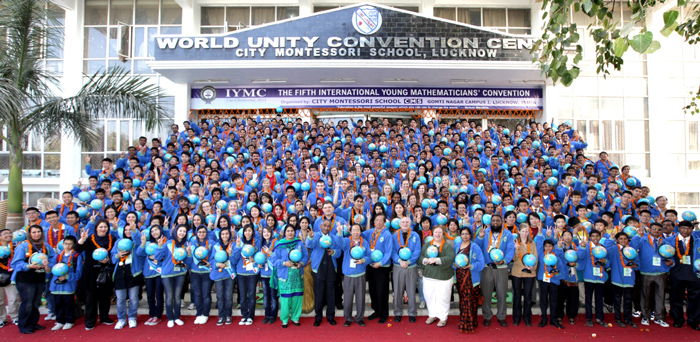
National Sports Day celebrated at City Montessori School
by Ratan Shukla / 14 September 2023At the City Montessori School, Rajajipuram Campus II, the National Sports Day on 29th August was celebrated as 'Athlopolics', a sports event was conducted dedicated to the junior section students.
The event was a healthy amalgam of prayers, pledges, and athletic activities, all curated to cultivate a disciplined and physically fit lifestyle among the students.
The event commenced with a prayer and a powerful thought, followed by a virtue and pledge, setting an honorable start to an energetic day.
The importance of embracing sports in daily life was emphasized by the Head Girl during her speech, further reiterated by the principal's address. The inspirational speeches set the stage for the physical endeavors to follow, starting with a stimulating aerobics session led by the energetic girls of Class 5.
Post aerobics, a range of races engrossed everyone present. The first race, Carrom, was fervently inaugurated by the principal herself. Diverse races ensued, including traditional sprints, one-leg and three-legged races, and shuttle and relay races which witnessed immense enthusiasm and competitive spirit.
Unique, fun-filled competitions like the pastry race, Hoola hoop race, crocodile race and throw and catch race left everyone exhilarated. The girls showcased their agility in the skipping race. It was then followed by a gripping Kabaddi match by the boys of Class VIII.
Without a doubt, one of the most anticipated events of the day was the gripping Kabaddi match between the boys of Class VIII. As the audience waited, the atmosphere was thick with palpable excitement and eager anticipation. With every Kabaddi chant, the venue was filled with an electric atmosphere, further fuelled by the loud cheers and encouraging shouts from the audience.
The day was concluded by prize distribution, leaving behind a trail of victorious smiles and the joyous spirit of sportsmanship.
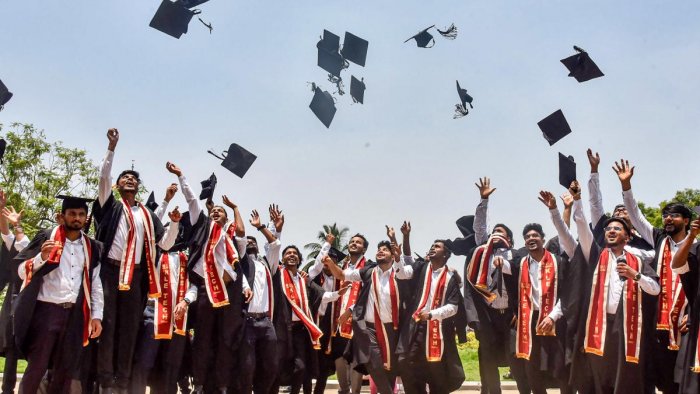
Should there be a common syllabus for higher education?
by Ashok Kumar / 28 May 2023Education is a fundamental human right and a key driver of economic and social progress. Recognizing the importance of education, the Indian government introduced the National Education Policy (NEP) 2020, which is a comprehensive framework for the development of education in the country. The NEP 2020 aims at transforming the Indian education system by making it more inclusive, holistic, and flexible.
The NEP 2020 aims to transform higher education in the country by promoting research and innovation, establishing new multidisciplinary institutions, and increasing the Gross Enrolment Ratio (GER) in higher education.
The NEP 2020 is clear when it comes to matters of curriculum, pedagogy and assessment. It lays great emphasis on the autonomy and academic freedom of institutions.
Autonomy in higher education may be defined as a functional status given to universities and colleges by the University Grants Commission (UGC) for giving greater flexibility towards academic development with regard to the improvement of academic standards and excellence. An autonomous college/institution is given the freedom to be a norm to itself and for self-governance. College autonomy enables colleges to award degrees on behalf of the affiliating University by providing more academic and operative freedom to function better with credibility. The UGC guidelines for autonomous colleges (2018) highlighting the importance of autonomous colleges, indicate that the only safe and better way to enhance the standard of undergraduate education is to delink most of the colleges from the affiliate system. Further, it states that colleges with academic and operative freedom are doing better and have more credibility and the financial support to such colleges boosts the concept of autonomy.
The idea of a common syllabus in higher education appears to be mooted in a few states for improving the quality of education. This idea is against the objectives and the spirit of the NEP 2020. The issue of inadequacy of the quality of education needs deeper evaluation. Though the syllabus lays the framework for carrying out the teaching-learning process, quality is predominantly decided by the efficacy of teaching-learning processes for greater learning. The vision, competence and commitment of institutional leadership, teachers, and staff play a critical role in improving the quality of education in HEIs. The rhetoric for having a common syllabus shall eventually diminish the possibility of certain HEIs achieving distinctions.
The basic objectives of NEP 2020 clearly rule out the Common Syllabus. Section (11.6). of the NEP 2020 policy clearly states that large multidisciplinary universities and colleges will facilitate the move towards high-quality holistic and multidisciplinary education. Flexibility in curriculum and novel and engaging course options will be on offer to students, in addition to rigorous specialization in a discipline or discipline. This will be encouraged by increased faculty and institutional autonomy in setting curricula. Pedagogy will have an increased emphasis on communication, discussion, debate, research, and opportunities for cross-disciplinary and interdisciplinary thinking. Further, the NEP section (12.2) reads "in order to promote creativity, institutions and faculty will have the autonomy to innovate on matters of curriculum, pedagogy, and assessment...Accordingly, curriculum and pedagogy will be designed by institutions and motivated faculty to ensure and stimulating and engaging learning experience for all students.” The question of whether there should be a common syllabus for undergraduates in higher education in India is a complex and contentious one. There are arguments both in favour of and against a common syllabus.
On the one hand, advocates of a common syllabus argue that it would promote standardization and uniformity in higher education, ensuring that all students are exposed to a similar set of knowledge and skills. This would help to address issues of inequality and disparities in access to education across different regions and socioeconomic backgrounds. If all the universities in India follow a uniform syllabus, they argue, it would help to reduce the apprehension of those students whose parents are in transferable jobs and that students may use the same books wherever they go and this in turn would help at reducing the cost of any further purchases. Moreover, it would h also lessen the burden on the brain of the students as they could follow the same syllabus wherever they go without having to lose at least one very precious academic year.
On the other hand, critics of a common syllabus argue that it would stifle innovation and creativity, and limit the ability of individual institutions to develop unique programs that cater to their specific strengths and areas of expertise. Furthermore, India is a diverse country with many different languages and cultures, and imposing a single syllabus could be seen as an attempt to homogenize this diversity.
Higher education is all about disseminating specialized knowledge. Every institution is supposed to develop its own specialized domain for recognition. A common syllabus across institutions is against the spirit of such specialized centres of learning. Secondly, a common syllabus across institutions especially in a country like India is likely to erase local and regional concerns, especially in Social Sciences and humanities there should be an emphasis on regional variations in knowledge dissemination to cater to the minds of students of that region. A Common syllabus across the length and breadth of a vast country like India would fail to do so. There is a high possibility that a particular region, culture, or social configuration shall be hegemonically imposed ignoring regional diversities and concerns.
A common syllabus fails to take into account inputs from diverse stakeholders not only regionally but in terms of community, religion, caste, gender etc. For example, an Indian literature paper from a university in UP is bound to differ from that of the University of Maharastra, or a history syllabus from Tamil Nadu will differ from that of a university in Assam. Teaching all students across the National spectrum the same syllabus shall be insular. Unless there is diversity in the courses, new subjects will not be created.
Until all the universities/colleges have the same process of admissions, fee structure, uniform examination pattern, and infrastructure – teachers, labs, subject-related equipment, library, etc., applying the same curriculum can be fatal. It doesn't seem to be possible in colleges. Ultimately, the decision on whether to implement a common syllabus in Indian higher education should be based on careful consideration of the potential benefits and drawbacks, as well as a recognition of the unique challenges and opportunities presented by the Indian context. Above all, by introducing a common syllabus we will be sabotaging the spirits of NEP 2020.
The idea of a common syllabus across all HEIs in India may attract the imagination of policymakers and other stakeholders because of its emphasis on “uniformity”. But a closer critical look would expose its fault lines. Moreover, the adoption of a common syllabus with minimum flexibility conceals ideological agenda that is against the spirit of academic federalism and autonomy, the backbone of higher education.
The author is a Former Vice Chancellor Kanpur & Gorakhpur Universities
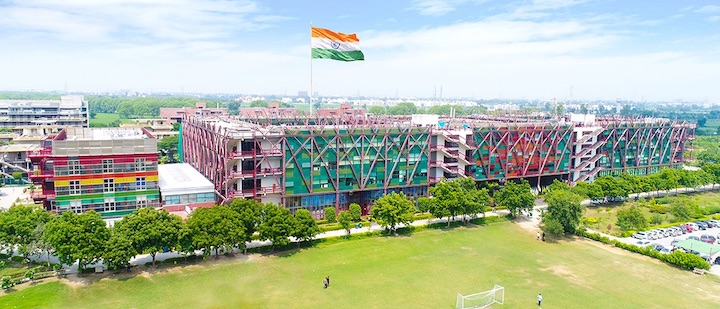
O.P. Jindal Global University is top ranking institution in India
by Opinion Express / 09 June 2022O.P. Jindal Global University (JGU) has emerged as India's No. 1 Private University for the third year in a row, according to the QS World University Rankings 2023 that was released in New York.
London-based Quacquarelli Symonds (QS) has ranked a total of 41 institutions from India this year, including seven new entrants.
JGU has retained its No. 1 position among the Indian private universities despite the rise in the number of ranked institutions. For the 2023 edition, QS analysed a total of 2,462 institutions and ranked 1,422 institutions in the world. JGU is ranked in the 651-700 band this year, making it the only private university from India, which has found a place among the world's top 700 universities.
JGU is also India's No. 1 ranked university with a focus solely on social sciences, arts and humanities, as per the influential QS World University Rankings 2023. Out of the 41 institutions which have been ranked from India, 11 are IITs.
Remarkably, JGU is also the only Indian non-STEM and non-Medicine university to have found a place in the QS World University Rankings 2023.
. JGU is India's No. 1 ranked university with a focus solely on social sciences, arts and humanities.
. JGU is the only Indian non-STEM and non-Medicine university to have found a place in the QS World University Rankings 2023.
. Globally, JGU has been ranked in the 651-700 band of the QS World University Rankings 2023.
. This is the third year in a row that JGU has been the highest ranked Indian private university in the QS World University Rankings.
. In faculty-student ratio, JGU is the second highest-ranked university from India.
. In international faculty ratio, JGU is the third highest-ranked university from India.
. JGU is ranked among the top 250 universities in the world in faculty-student ratio.
. JGU is ranked among the top 450 universities in the world in employer reputation.
Reacting to the performance of Indian universities in the QS World University Rankings 2023, the Founding Chancellor of O.P. Jindal Global University and its benefactor, Naveen Jindal, said, "It is a remarkable day for Indian higher education as the QS World University Rankings 2023 have shown that the numbers of Indian institutions which have found a place in the global rankings have grown.
"Out of the 41 institutions from India which have been ranked this year, seven are new entrants. It indicates a conscious effort by Indian higher education institutions to improve the quality of teaching and research to a level that matches global standards. If this trend continues, Indian universities will soon bring greater glory to the nation through global recognition."
Speaking of JGU's accomplishment, Jindal remarked, "To be recognised as India's No. 1 private university for the third year in a row by the prestigious QS World University Rankings is quite an achievement for JGU. The fact that a non-STEM and non-Medicine university has emerged as India's top private university year after year proves that the study of humanities and social sciences has tremendous relevance for employment generation as well as for the creation of knowledge needed for solving the complex problems that the world faces today.
"I wish to congratulate the Vice Chancellor, faculty, and staff of JGU for their commitment to making world-class education in India possible for our students."
Welcoming this exciting development, Professor (Dr.) C. Raj Kumar, Founding Vice-Chancellor of O.P. Jindal Global University said, "The QS World University Rankings provide millions of students around the world with a benchmark for choosing higher education institutions.
"To be featured among the top 700 best universities around the world in this prestigious list that covers 100 locations and over 40,000 universities in the world is a matter of tremendous significance for JGU as the university has emerged as a top destination for world-class education in India within just 12 years since its founding. The fact that JGU has maintained its position as the No. 1 Private University in India for three years in a row amid the extremely challenging circumstances of the devastating global pandemic exhibits the resilience of the university's strong foundations designed to foster academic excellence and create exciting new opportunities for our students".
"JGU has improved its global rankings this year on the back of its excellent faculty-student ratio, employer reputation and international faculty ratio. The performance of JGU in the QS Global University Rankings 2023 underlines the importance of providing a global learning experience that caters to the aspirations of today's youth. Internationalisation has at the very core of JGU's mission to create open spaces for research, dialogue and innovation through interdisciplinary education and hands-on learning.
"It is this mission that has driven JGU to hire full-time faculty members from over 40 countries and collaborate with over 350 leading institutions spread across 65 countries around the world. We remain committed to further increasing international collaborations and improving the quality of teaching, research and learning outcomes," Professor Raj Kumar said.
For the QS World University Rankings, universities are evaluated on the basis of academic reputation, employer reputation, faculty-student ratio, citations per faculty, international faculty ratio and international students ratio. QS analysed 151,000 responses from academics around the world and 99,000 responses from employers worldwide for this year's rankings. In faculty-student ratio, JGU, which received a score of 63, is the second highest-ranked university in India. In the international faculty ratio, JGU, which received a score of 22.6, is the third highest-ranked university from India. In employer reputation, JGU scored higher than 31 of the 41 institutions ranked from India.
Providing a closer analysis of the rankings, Professor Arjya Majumdar, Dean, Office of Rankings, Benchmarking and Institutional Transformation (ORBIT), O.P. Jindal Global University observed, "As per the QS World University Rankings 2023, JGU is ranked among the top 250 universities in the world in faculty-student ratio, among the top 450 universities in the world in employer reputation, and among the top 550 universities in the world in international faculty ratio.
"Overall, JGU ranked higher than such internationally acclaimed universities as the City University of New York, University of South Carolina, University of Bradford, Kagoshima University, University of Westminster and Beijing University of Technology, among others. The results show that JGU is now in the same league as some of the leading international universities, including Drexel University (US), University of Plymouth (UK), University of Southern Queensland (Australia), University of Manitoba (Canada), Kumamoto University (Japan), Abu Dhabi University (UAE), Chongqing University (China), Coventry University (UK) and Istanbul Technical University (Turkey), among others. This is a significant development for India and for JGU as it demonstrates what a young university in India can achieve in a relatively short span of time with the right combination of ideas, people and resources."
In the QS World University Rankings 2023, 16 of the 20 institutions selected for granting "Institution of Eminence" (IoE) status by the Government of India have found a place. These include 4 IITs, Indian Institute of Science, Delhi
University, Anna University, University of Hyderabad, Jadavpur University, Banaras Hindu University, O.P. Jindal Global University, Manipal Academy of Higher Education, BITS Pilani, Amrita Vishwa Vidyapeetham, Vellore Institute of Technology (VIT) and Jamia Hamdard. Out of those 16 institutions, 7 institutions, including O.P. Jindal Global University, moved up in the rankings, 4 went down and 5 remained in the same positions as last year.
Commenting on the accomplishment, Professor Dabiru Sridhar Patnaik, Registrar, JGU, said, "As only those universities which shine on teaching and research quality make it to the QS World University Rankings, being recognised as one of the world's Top 700 universities by QS puts JGU in a distinguished league of internationally acclaimed universities. The high employer reputation score of JGU also signifies that the university has been successful in providing our students with the necessary preparations needed for securing gainful employment.
Moreover, it underlines that the graduates produced by JGU have been competent, innovative and effective. What makes JGU the incredible institution that it is today is the spirit of public service with which it functions. We remain committed to continue this tradition of institutional excellence in the coming years and decades."
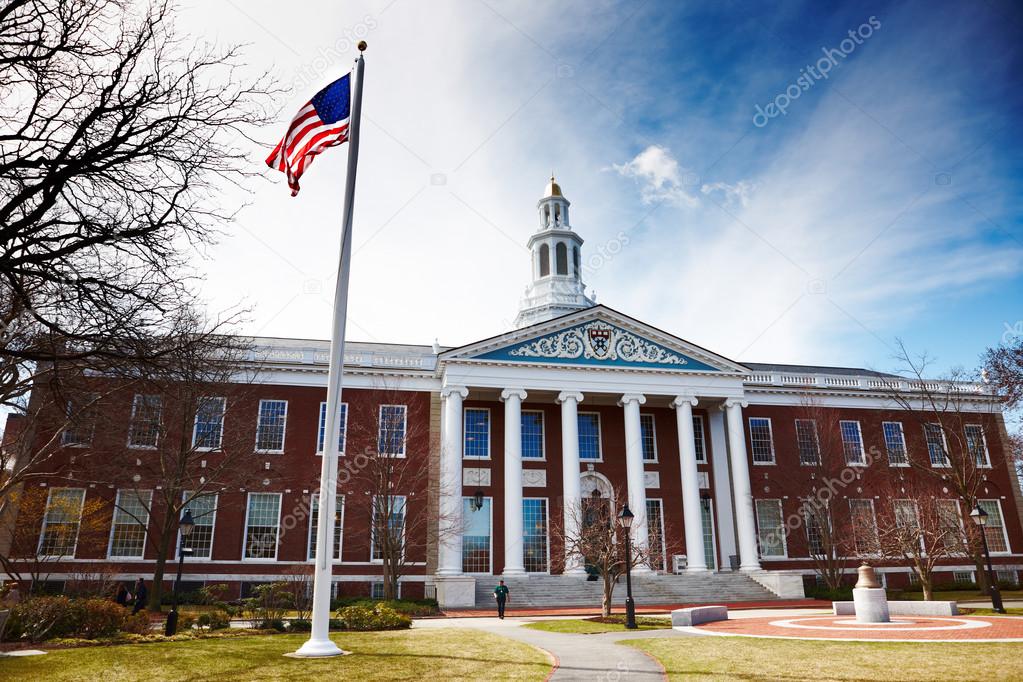
Harvard on human subjugation, immoral slavery practices
by Opinion Express (IANS) / 27 April 2022Harvard University, arguably the world's premier name in education, has laid bare a troublesome tryst with slavery and earmarked $100 million as reparation.
In a letter to the Harvard community, the University President Lawrence Bacow made public a detailed report, "Harvard and the Legacy of Slavery," aiming "to uncover truth..(and) embrace it even when it makes us uncomfortable or causes us pain".
"Enslaved people worked on our campus supporting our students, faculty, and staff, including several Harvard Presidents. The labor of enslaved people both far and near enriched numerous donors and, ultimately, the institution. Some members of our faculty promoted ideas that gave scholarly legitimacy to concepts of racial superiority. And long after the Thirteenth Amendment abolished slavery in the United States in 1865, Harvard continued discriminatory practices that sharply limited the presence of African-Americans in our campus," said the report Bacow had created under Tomiko Brown-Nagin, Dean of the Radcliffe Institute for Advanced Study and Daniel P.S. Paul, Professor of Constitutional Law and Professor of History.
"We cannot dismantle what we do not understand, and we cannot understand the contemporary injustice we face unless we reckon honestly with our history," Bacow said.
"As the committee's report powerfully documents, Harvard's history includes extensive entanglements with slavery. The report makes plain that slavery in America was by no means confined to the South. It was embedded in the fabric and the institutions of the North, and it remained legal in Massachusetts until the Supreme Judicial Court ruled it unconstitutional in 1783. By that time, Harvard was nearly 150-years-old. And the truth is that slavery played a significant part in our institutional history."
"Harvard has made much progress in recent decades, but we have much work still to do. Our recent progress must not obscure the reality of our past or the continuing effects of the past on the present."
"The legacy of slavery, including the persistence of both overt and subtle discrimination against people of colour, continues to influence the world in the form of disparities in education, health, wealth, income, social mobility, and almost any other metric we might use to measure equality. While Harvard does not bear exclusive responsibility for these injustices, and while many members of our community have worked hard to counteract them, Harvard benefited from and in some ways perpetuated practices that were profoundly immoral. Consequently, I believe we bear a moral responsibility to do what we can to address the persistent corrosive effects of those historical practices on individuals, on Harvard, and on our society," the Harvard University President added.
In addition to shedding fresh light on Harvard's entanglements with slavery and its aftermath, the report makes recommendations for how as a community the university can redress "through teaching, research, and service" legacies with slavery. Together they represent guideposts as Harvard considers how to approach the future in ways that properly reckon with its past.
The university appointed an implementation committee to be chaired by Martha Minow, the 300th Anniversary University Professor, former Dean of Harvard Law School, and a member of the Committee on Harvard and the Legacy of Slavery.
To provide the resources, the Corporation has authorised a commitment of $100 million for implementation.
Some of the funds will be available for current use, while the balance will be held in an endowment to support this work over time.
In his own letter to alumni, Harvard Business School Dean, Srikant Datar said the Brown-Nagin committee has painstakingly researched a painful truth.
"During the 17th and 18th centuries, the sale and trafficking of human beings "in slavery" and the industries rooted in the labor of enslaved women, men and children were pervasive around the world, comprised a vital part of the New England economy, and powerfully shaped Harvard University. Harvard leaders, faculty, staff and benefactors enslaved people, some of whom labored at the University; accrued wealth through the slave trade and slave labor; and defended the institution of slavery."
"Harvard's strength today was built on human subjugation and the systems "including business" that perpetuated it. It is only with and through truth that we can learn from the tragic mistakes of the past," Datar added.

BHU to follow Nalanda, Taxila model of global education hub
by Opinion Express / 11 April 2022A symbol of knowledge, education and culture, Banaras Hindu University (BHU) has established itself as a global education hub on the lines of Nalanda and Taxila. Located in the ancient city of Varanasi, the BHU is known worldwide as an institution of distinction having students from South Africa, Brazil, Russia, France, Ireland, Australia, Yemen and Iran, are studying in the 'Institution of Eminence'.
Talking to IANS, University vice-chancellor Prof. Sudheer Jain said that a lot of hard work needs to be done for taking BHU to the next level.
A scholarship of Rs 6,000 per month for foreign students are being introduced to attract more and more students from abroad, he said. Another provision for attracting foreign students is increasing the scholarship amount if their performance is satisfactory, he said.
The scholarship scheme was approved in a meeting of the governing body of the varsity. For the effective and efficient implementation of the scheme, the varsity has formed a three-member committee.
Applications for this scheme will be received in the Institution of Eminence Cell. The main reason why BHU attracts foreign students is that it is an institution of eminence.
The vice-chancellor told the IANS that the university provides education in various streams including Humanities, Social Sciences, Medicine, Technology, Science, Arts and Performing Arts, which truly signify BHU as the capital of omniscience.
Every year, thousands of foreign students take admitted in graduate, postgraduate, PhD and diploma courses. Currently, 15 per cent of the seats are reserved for foreign students which is supernumerary for them.
The scholarship scheme also gives thrust to national education policy 2020's sentiment of internationalization of India's education system.
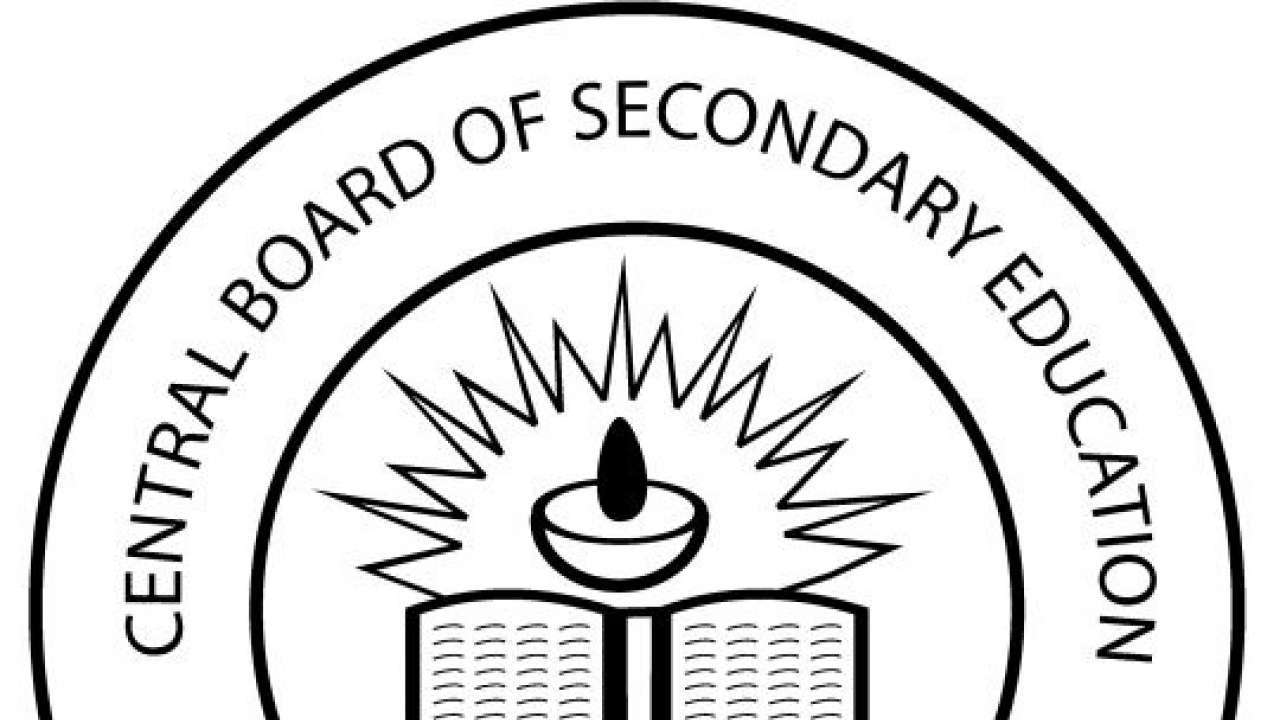
Majority approves govt's decision to cancel Class XII board exams
by Opinion Express / 04 June 2021
New Delhi, June 3 (IANS) As many as 56.4 per cent of the people approve the Central governments decision to cancel the Class XII board exams of CBSE and CICSE in view of the second wave of the Covid-19 pandemic, according to the IANS-CVoter CBSE Snap Poll.
The IANS-CVoter CBSE Snap Poll was conducted in the aftermath of the Union government's decision to cancel the Class XII board exams taken on June 1. The all-India sample size for the snap poll was 5,422 and the fieldwork was conducted on June 2.
Similarly, 56.6 per cent of those interviewed in the states said that the state board exams for Class XII should also be cancelled because of the prevailing Covid situation in the country.
Notably, while several states like Rajasthan, Goa, Madhya Pradesh, Gujarat and Uttarakhand have cancelled the Class XII board exams, Chhattisgarh is holding offline exams. Others, including Karnataka and Odisha, are yet to announce their final decision on the matter.
The majority of the respondents said that while career is important for the students, health risks should be avoided keeping in view of the spread of the deadly virus in the country, stating that conducting offline exams can prove fatal.
Notably, 60 per cent of those surveyed said that cancelling Class XII board exams can have adverse impact on the career of the students and to avoid such a situation, the government should opt for alternate mechanisms like digital mediums to conduct various exams.
A whopping majority of the respondents -- 76.4 per cent -- said the government should think of using digital mediums to conduct various competitive exams like IIT/JEE, NEET and for admissions to universities and colleges in a fair manner to prevent loss of a career year of the students.
However, 60 per cent of the respondents expressed concern about the digital divide in the country and said that children not having access to digital platforms, especially in the rural areas, will be in disadvantageous position.
A large number of respondents said the government should work on improving digital infrastructure in the rural areas of the country in order to face such challenges in the future.
Notably, a large number of respondents expressed concern about vaccines not being made available for the students in this age group; 63 per cent of the respondents asserted that the government should work towards getting vaccines for the students in this age at the earliest, as they are at a crucial stage of their careers.
A large number of respondents -- 46.2 per cent -- said the government had an option of postponing the exams and conduct them at a later stage after getting children in this age group fully vaccinated.
In view of the uncertain conditions brought about by the pandemic and taking into account the feedback obtained from the various stakeholders, the Centre on Tuesday decided to cancel the CBSE Class XII board exams for 2021.
After the government's decision to cancel the CBSE board exams, the Council for the Indian School Certificate Examinations (CISCE) too scrapped the ISC Class XII exams for this year, saying that a scheme for evaluating the students will be announced soon.
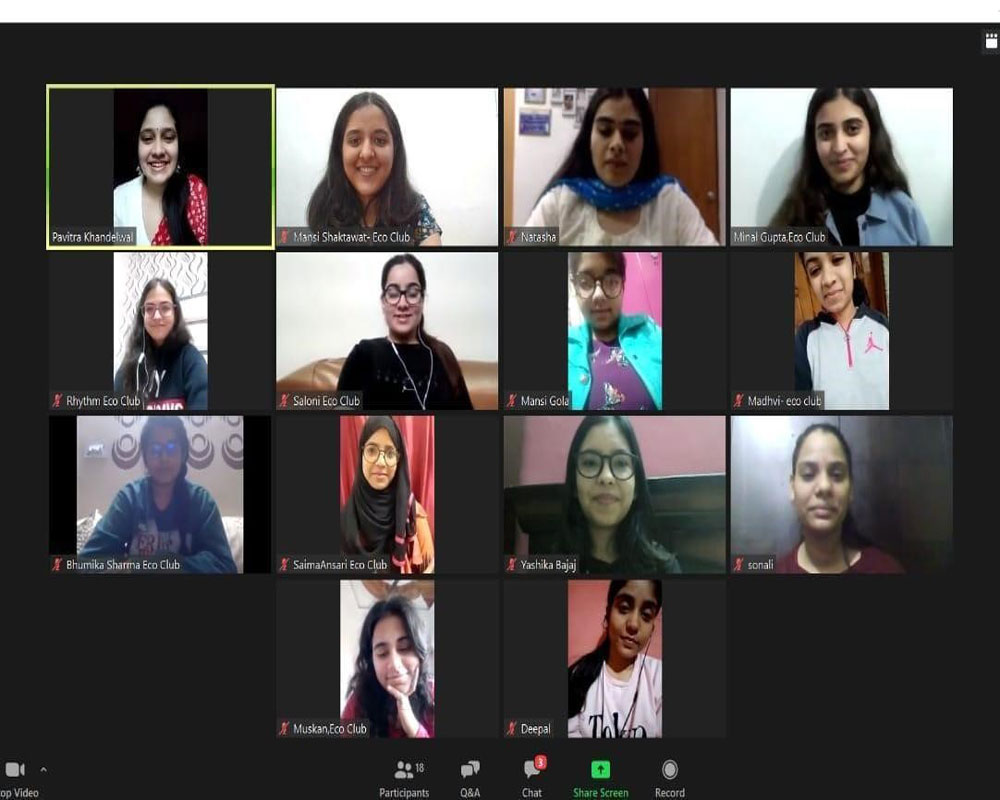
TRASH TO TREASURE
by Opinion Express / 06 December 2020Workshop on upcycling Fabric waste
Eco Club of Lady Irwin College, in collaboration with Ms. Rupal Jain, Ms. Vridhi Grover and Ms. Darshana Tikmani organised a workshop “Trash to Treasure” on 5th of December 2020. As we all know that textile waste is one of the root causes of pollution today as it takes many years to decompose. It is either burnt or thrown away which creates a lot of destruction in the society. Keeping this in mind, the workshop conducted, was about Upcycling of Fabric Waste and its different techniques. The event was graced by Dr. Sushma Goel, Dr. Deepali Rastogi and Mr. Rajneesh Dwevedi, the Staff Advisors of Eco Club.
Natasha Bhasin, Secretary of Eco Club moderated the session which started with Ms. Rupal Jain explaining about upcycling and different ways to upcycle waste materials then Ms. Darshana, Ms. Rupal and Ms. Vridhi showed various tips and techniques to make coasters, key chains and some amazing decorations that can be used during Christmas. Further, they also showed and taught how to make floral hangings, buntings and beautiful puffed earnings of different shapes and sizes. Everything was very attractive, upcycled and helpful at the same time. The session was fun – learning which ended with Q/A round and with the Vote of Thanks by Ms. Pavitra Khandelwal, President of Eco Club.

Lady Irwin College - ORIENTATION 2020 (DAY 2)
by Opinion Express / 20 November 2020Day 2 orientation of Lady Irwin College, themed VIBGYOR, started with students dressed up in colors of the rainbow. The event was marked by the wise words of the director, Dr. Anupa Siddhu. Students were introduced by the first year faculty enthusiastically for their new beginning; accompanied by the speech of College President, Shivani Singh, a co-curricular session started. Firstly all the Students’ Association central members introduced themselves. The session then moved on to the society performances & introduction of 14 different societies existing in college that inspired students to groom their personalities through this platform that the college provides. Also, many students actively participated in showcasing their talents.
Students were also made familiar with the college campus via virtual college tour. The orientation booklet was also shown to students by the Cultural President, Ms. Drishti Gupta & the procedure for enrolling into different societies was told by College Treasurer, Ms. Aishwarya Nair.
Students were provided with the links to join their respective whatsapp groups that did not create any confusion to the new batch regarding the joining of classes. And the session was ended by clarifying the major doubts of the freshers, followed by a vote of thanks by the College President.
FREE Download
OPINION EXPRESS MAGAZINE
Offer of the Month





